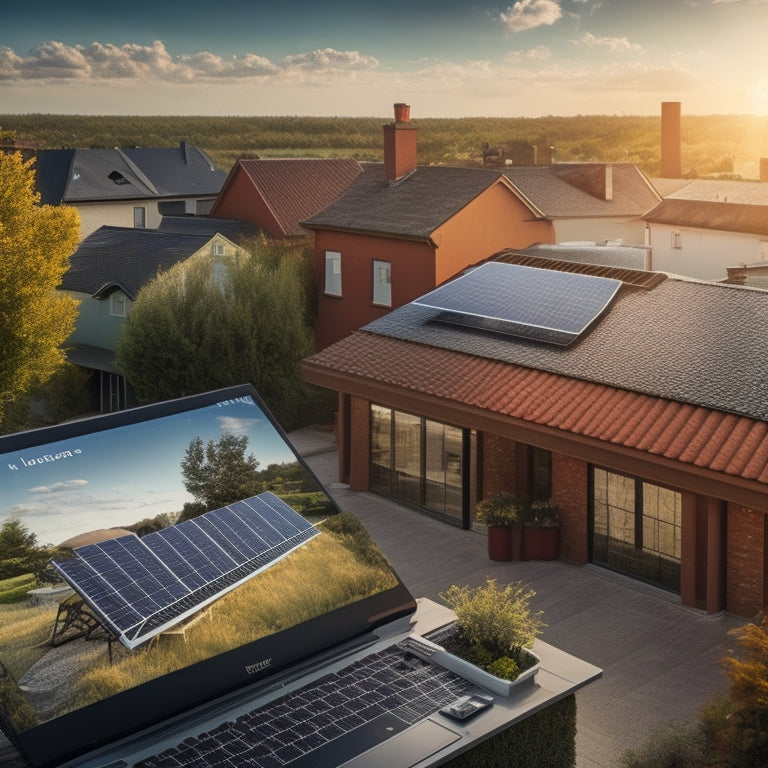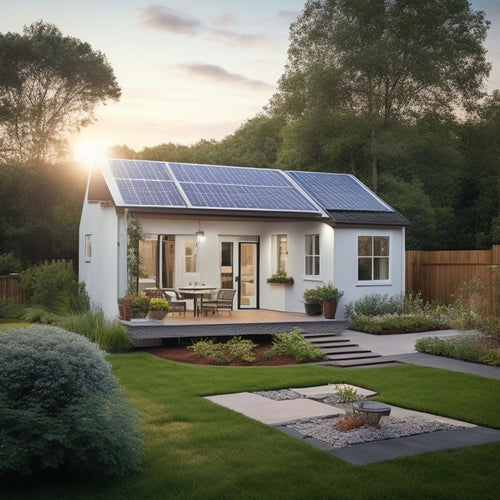
Why Residential Solar Panel System Prices Vary Online
Share
When comparing residential solar panel system prices online, you may notice significant variations. It is crucial to understand that these differences stem from factors like equipment quality, affecting system performance and longevity. Installation company labor costs, including installer expertise and permitting fees, also play a significant role. Additionally, system size and roof complexity, local incentives, and retailer markups contribute to the price disparities. As you explore online, keep in mind that these factors influence the prices you see, and understanding each aspect can help you make a more informed decision - and uncovering these details can reveal even more insights.
Key Takeaways
• Quality of equipment impacts performance and longevity, with reputable manufacturers offering better warranties, affecting system cost.
• Installation company and labor costs vary depending on installer expertise, installation complexity, and market rates.
• System size and roof complexity influence overall cost, with larger systems and intricate roofs requiring more materials and time.
• Local incentives and rebates, such as tax credits and utility discounts, vary by location, impacting the final system cost.
• Online marketplace and retailer markups, including shipping costs, can increase system cost by 10% to 20%, depending on the retailer.
Quality of Solar Panel Equipment
The quality of solar panel equipment greatly impacts the overall performance and longevity of a residential solar panel system. You'll want to make sure that the components you choose are reliable and efficient. When it comes to panel durability, you'll want to look for equipment that can withstand various environmental conditions, such as extreme temperatures, humidity, and weather events. A durable panel will guarantee that your system operates at peak levels, even after years of use.
It's also essential to take into account the equipment warranty offered by the manufacturer. A thorough warranty can provide you with peace of mind, knowing that you're protected in case of equipment failure or malfunction. Look for a warranty that covers parts and labor for an extended period, ideally 25 years or more.
A reputable manufacturer will stand behind their products and provide a warranty that reflects their confidence in the equipment's performance. By choosing high-quality equipment with a reliable warranty, you can ensure that your residential solar panel system operates efficiently and effectively for years to come.
Installation Company and Labor Costs
You'll also need to factor in the installation company and labor costs, as a skilled and experienced installer can make a significant difference in the overall performance and longevity of your residential solar panel system. The installation company's labor costs will depend on factors such as the crew's expertise, the complexity of the installation, and the local market rates. A more experienced installer may charge higher labor costs, but they'll also guarantee a higher-quality installation that lasts longer.
Permitting fees are another aspect to take into account, as they can vary depending on your location and local regulations. These fees can add up quickly, so it's crucial to factor them into your overall costs. A reputable installation company will handle the permitting process for you, but you'll still need to pay the associated fees.
When evaluating installation companies, consider their crew's expertise, the quality of their work, and their reputation in the industry. Be cautious of extremely low labor costs, as they may indicate a lack of experience or a rushed installation.
System Size and Roof Complexity
Your residential solar panel system's size and complexity will greatly influence its overall cost, as larger systems with more panels require more materials, labor, and installation time.
The number of panels you need depends on your energy usage and the size of your roof. A larger system will naturally cost more, but it'll also generate more power.
When evaluating your roof's complexity, consider factors like roof orientation, which affects the system's energy output. A south-facing roof is ideal, but east- or west-facing roofs can still work well.
Shading analysis is also important, as even partial shading can reduce energy production. Trees, nearby buildings, or architectural features can all cast shadows that impact your system's performance.
A more intricate roof with multiple skylights, vents, or steep angles may require additional installation time and materials, increasing costs. Be prepared to discuss these factors with your installer to ensure an accurate quote and efficient system design.
Local Incentives and Rebates Vary
Local governments and utilities offer varying levels of financial incentives to encourage residential solar adoption. Understanding these rebates is essential for calculating your system's total cost. You'll need to research the specific incentives available in your area, as they can greatly impact your system's overall cost.
State policies provide tax credits or property tax exemptions that reduce your system's cost. Utility discounts, such as net metering, can also save you money on your energy bills. Government programs, like the Federal Solar Investment Tax Credit, can provide a substantial percentage of your system's cost back as a tax credit. Additionally, some utilities offer rebates or discounts for residential solar installations.
When researching local incentives, be sure to take into account the specific programs available in your area and how they can be combined to maximize your savings. By understanding these incentives, you can accurately calculate your system's total cost and make an informed decision about your residential solar investment.
Online Marketplace and Retailer Markups
When comparing prices on online marketplaces, be prepared to factor in retailer markups that can increase the cost of your residential solar panel system by as much as 10% to 20%. These markups can vary greatly depending on the retailer, shipping costs, and online reviews.
| Online Marketplace | Markup Range |
| Amazon | 5% - 15% |
| eBay | 8% - 18% |
| Home Depot Online | 10% - 20% |
| Specialized Solar Retailers | 5% - 12% |
As you shop online, consider the costs associated with shipping and handling. These costs can be significant, especially for larger solar panel systems. Be sure to factor in these costs when comparing prices across different online marketplaces. Additionally, pay attention to online reviews from other customers to get a sense of the retailer's reputation and customer service. By understanding the markups and additional costs, you can make a more informed decision when purchasing your residential solar panel system online.
Frequently Asked Questions
Can I Install Solar Panels on a Metal or Asphalt Roof?
When you're considering solar panels, you're wondering if they can be installed on a metal or asphalt roof. The answer is yes, but the roof material affects installation challenges, so be prepared for added complexity and potential extra costs.
Do I Need a Southern-Facing Roof for Solar Panels to Work?
You don't necessarily need a southern-facing roof for solar panels to work, but ideal roof orientation is essential; consider shading concerns and adjust your installation accordingly to maximize energy output.
Can I Finance My Solar Panel System Through a Loan?
You can finance your solar panel system through a loan, exploring various loan options with competitive interest rates, allowing you to harness renewable energy while managing upfront costs.
How Long Does a Typical Solar Panel Installation Take?
As you plan your solar panel installation, you're likely wondering how long it'll take. Typically, a residential installation takes 1-3 days, depending on system size and complexity, with efficient installers addressing your Solar Timeline Concerns for a smooth process.
Will Solar Panels Increase My Property Value?
As you harness the power of the sun, you'll be thrilled to know that solar panels will indeed increase your property value, according to a recent property appraisal study, boosting your home's resale value by up to 17%.
Related Posts
-

7 Best RV Battery Charging Panels for Your Adventures
You're searching for reliable and efficient solar charging solutions to power your RV battery on the go. Explore top-...
-

Charging On-The-Go: Portable Battery Solutions Online
You're always on the move, and your devices need to keep up - that's why having a reliable portable battery solution ...
-

5 Essential Tips for Your DIY Home Solar System
To guarantee a successful DIY home solar system installation, you'll need to assess your energy consumption, choosing...


